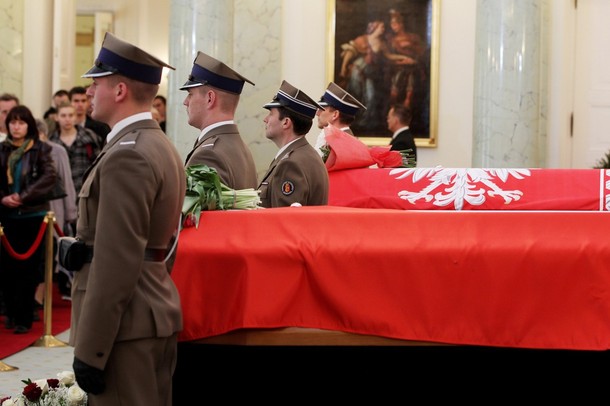
They say every cloud has a silver lining. The tragic plane crash that took the lives of so many of Poland’s finest over the weekend may be a case in point, providing an opportunity to heal wounds old and new.
President Obama has announced that he will attend the funeral.
The White House said today that President Barack Obama will fly to Poland to attend the state funeral of Polish President Lech Kaczynski on April 18. A statement by the White House said, "The president will travel to Krakow, Poland to attend the State Funeral of President Lech Kaczynski and First Lady Maria Kaczynska on Sunday, April 18th."
White House spokesman Robert Gibbs said today that "the president will travel to Krakow to express the depth of our condolences to an important and trusted ally."
Presidents frequently skip state funerals, passing the duty on to their vice president. By attending personally, Obama can undo some of the damage he did by not only canceling his predecessor’s basing of defensive missiles in Poland but rolling it out on the 70th anniversary of the Soviet invasion. This sends the signal that Poland is indeed a valued ally and that the United States will stand with her in difficult times.
More importantly, however, is an opportunity for Poland and Russia to continue the healing process that was underway in the ceremonies recognizing the Katyn massacre. Russia’s leaders have won praise for their sensitive handling of the crash and its aftermath. And Washington Post columnist Anne Applebaum, who happens to be married to Polish foreign minister Radek Sikorski, is seeing other very positive signs.
[D]iscussion of these potential causes has been open and frank. The Polish prime minister, Donald Tusk, immediately flew to the crash site, accompanied by his Russian counterpart, Vladimir Putin. Polish forensic investigators were on the ground within hours. The Russian government is offering assistance and waiving visa requirements for all families who want to travel to Russia. There are television cameras everywhere. Russian airport officials have been speaking in public, answering questions, talking to journalists.
To the Western reader, none of this will seem unusual: Those kinds of things are expected after plane crashes, especially those involving prominent public officials. But in this part of the world — and especially in this particular piece of haunted forest — the open discussion of a tragedy represents a revolutionary change.
[…]
For half a century, the failure to tell the truth about Katyn created a profound lack of trust between Poland and Russia, one that continues to hamper political, economic and cultural ties between the neighboring countries even today. The ongoing distortions of Russian history have helped create a climate of public apathy and cynicism in Russia, too. The official lack of frankness in the past and about the past helps explain, for example, why so many Russians doubt that that their government has told them the truth about the terrorist attacks that periodically shatter the peace. Indeed, Russian officials are showing more transparency in the wake of this tragedy than they have shown after some of their own.
And yet there is no law that says the past has to strangle the present: Countries can change, political cultures can grow more open, politicians can learn not to shroud difficult events in mystery and deceit. Over the past 20 years, both Russian and Polish officials have begun to acquire the art of speaking with the public, even if they don’t always choose to do so. This is a real change, and we have seen over the past few days what kind of impact it can have.
It’ll take more than a few days to heal the damage caused by decades of brutality, occupation, and lies. But we can hope, at least, that this is the beginning of a trend rather than a momentary aberration.
James Joyner is managing editor of the Atlantic Council. Photo credit: Getty Images.
Image: poland-mourners_0.jpg
